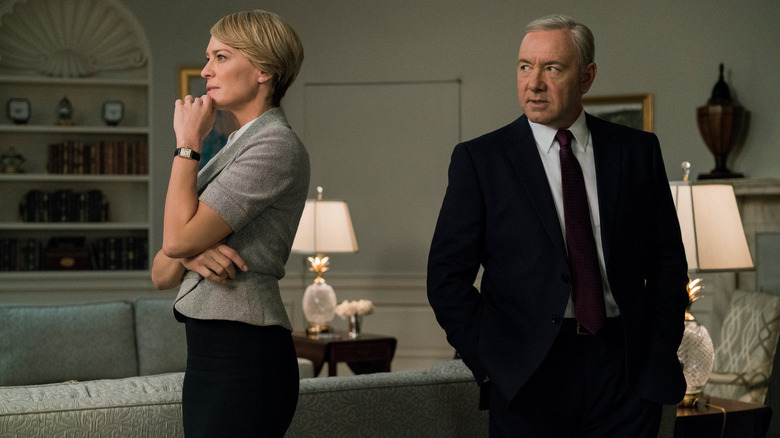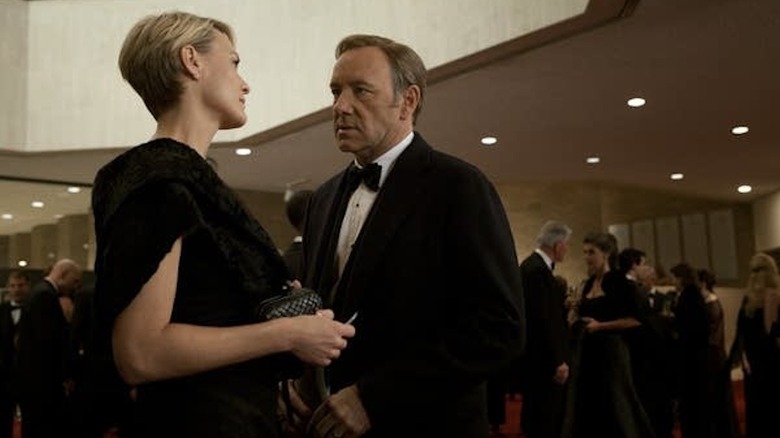Netflix Made David Fincher An Offer He Couldn't Refuse To Get House Of Cards
David Fincher was the most sought-after commercial and music video director in the world in 1992 when he followed the example of his predecessors Alan Parker, Ridley Scott, and Tony Scott by segueing into the unpredictable world of film production. Pulling a Ridley, so to speak, with "Alien 3" might've felt like a propitious move, but it turned into a nightmare production that resulted in the compromising of Fincher's dark vision and the damaging of a valuable studio franchise. The fledgling filmmaker took close to 100 percent of the blame, at which point it looked like he'd get kicked back down to videos and commercials for the foreseeable future.
As we know, he soared brilliantly out of the ashes three years later with "Se7en," and cemented his geek god cinema bona fides in 1999 with "Fight Club." Suddenly, Fincher was the Generation X Stanley Kubrick (even though, like many Gen X film favorites, he was technically a Baby Boomer), a visionary of the now who didn't just speak to the zeitgeist; he molded it. Unlike Kubrick, Fincher needed to make hits to keep earning the kinds of budgets required to realize his bold visions on his terms. No shade on "Panic Room" and, well, maybe some shade on "The Girl with the Dragon Tattoo," but Fincher had to play the studio game to ensure he could take a big swing like "Zodiac."
Ultimately, the forward-looking Fincher took note of the shifting media landscape and figured he should get in on this whole peak television phenomenon. He zeroed in on a remake of the BBC political thriller series "House of Cards," which would be written by up-and-coming scenarist Beau Willimon ("Farragut North," "The Ides of March"). When he landed Kevin Spacey and Robin Wright as his two scheming leads, he had a hot project on his hands. Every single network and cable channel would be beating down his door to broadcast this sucker, but in the early 2010s there was an unprecedented wrinkle: Netflix wanted to get in on the original programming game. And it was willing to spend to make a massive splash.
Netflix gave Fincher $100 million and the promise of no corporate interference
When Netflix co-CEO Ted Sarandos learned that David Fincher was preparing to pitch his first television series, "House of Cards," to all of the usual broadcast suspects, he spied an opportunity. Fincher and Spacey were an attractive package, but when Sarandos discovered that both artists were immensely popular with Netflix's subscribers, he reasoned that he could make an exorbitant offer to stream the show exclusively on his outlet. He was especially turned on by the subject matter. "It had sex and revenge — everything you want from television," he told Variety. "We had to have it."
Sarandos swooped in and took "House of Cards" straight off the market. He gave Fincher a $100 million budget and a two-season guarantee before the director had even shot the pilot. He also told Fincher there would be no notes from the Netflix C-suite. There was no competition because all of the other big players had to be cognizant of talent relationships. A sweetheart deal like this from HBO would have in-house favorites like David Chase and David Simon demanding commensurate creative freedom. Netflix didn't have creative relationships, so it made it rain all over Fincher and company.
Sarandos' other bold move was to release all 13 episodes of "House of Cards" on the same day, which kicked off the binge-viewing craze. Since the first two episodes were directed by Fincher, he had a perfectly primed pump as far as cinephiles were concerned. At an hour apiece, this was akin to getting a new Fincher feature. I'm not sure there would've been such an insatiable drive to inhale all of "House of Cards" without that added enticement, which is why I think it's appropriate to call Fincher, not Sarandos, the Godfather of Streaming.

